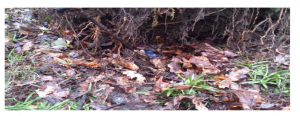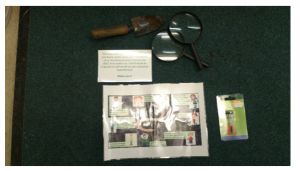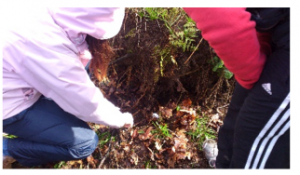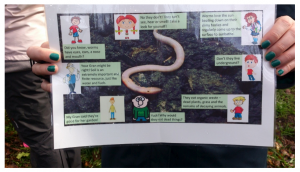We have been exploring the use of place-responsive teaching strategies to promote learning about scientific concepts and sustainability through the use of geocaching.
See: http://www.snh.org.uk/pdfs/publications/commissioned_reports/476.pdf (page 25)
This activity is perhaps not place-essential – however it is place-sensitive to an outdoor environment – ideally, in a woodland area.
Our geocache contents provide a starter activity for soil as an important and finite resource, aimed as a motivational hook for children working at First Level. It was hidden, as the name suggests, under the soil remains of a fallen tree (see picture). The finder is provided with a ‘Who Am I?’ riddle to, firstly, work out which organism they’ll be learning more about.
The finder will then be encouraged, through the use of the concept cartoon (below), to discuss facts and misconceptions about these superheroes of the soil, beginning with features of a worm itself. Tools such as a trowel and magnifying glass are provided to discover this creature for themselves so they can take a closer look. The concept cartoon progresses the discussion from features of worms to their role as indicators of soil quality.
This activity provides opportunities for further investigation within a range of scientific concepts, including: decomposition, soil quality, nutrient cycling, indicator species and soil as a finite resource.
In terms of outdoor management, small groups would be required to ensure all children are fully engaged and able to participate in the activity. Guidance should be sought to ensure children are not disturbing and destroying natural habitats. They should not dig in sensitive areas and should restore the site to its original form after investigation. Furthermore, worms should be handled with care.
Laura Johnston and Louise Stewart



